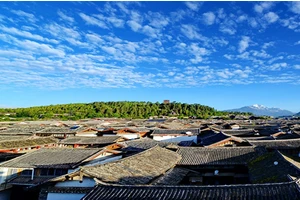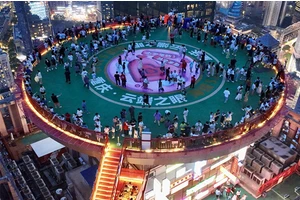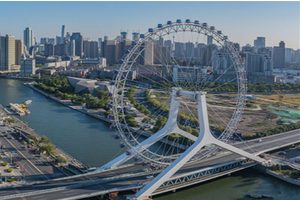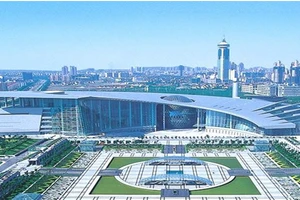Hangzhou tourism economy
With a long history of 2,200 years, Hangzhou is one of the seven ancient capitals in China, and it is also a key scenic tourist city and a famous historical and cultural city identified by the State Council. As the saying goes, "There is heaven above and Suzhou and Hangzhou below", Hangzhou has been a city with high frequency of tourism since ancient times. As a tourist city characterized by leisure and holiday tourism, Hangzhou has its unique advantages in realizing the daily and intimate tourism activities. As far as the internationalization of tourism in Hangzhou is concerned, Hangzhou's tourism industry has experienced a tortuous development process from scratch to prosperity, from government reception to industrial management. At present, tourism has become a pillar industry and a new growth point of the city's national economy, and its degree of internationalization has been continuously improved, making it one of the main industries to earn foreign exchange.
In 2007, Hangzhou received 2.086 million inbound tourists, an increase of 14.6% over the previous year. It received 41.1189 million domestic tourists, an increase of 11.7%. The city's total tourism revenue reached 63.006 billion yuan, an increase of 15.8%. By the end of 2007, there were 406 travel agencies and 250 star-rated hotels in the city. There are 25 A-level scenic spots in Hangzhou, including 1 5A scenic spot and 19 4A scenic spots.
In 2008, in the face of a series of disasters and crises, such as extreme weather (snowstorm), the continuous appreciation of RMB exchange rate, the decline of global economic prosperity, food safety incidents, Wenchuan earthquake and the difficulty in obtaining entry visas caused by the security of the Olympic Games, Hangzhou launched the "rescue measures" in time, and all economic indicators of the tourism industry still achieved steady growth. In 2008, Hangzhou received 2.213 million overnight visitors, an increase of 6.1%. Tourism foreign exchange income was 1.296 billion US dollars, up by 15.8%; The total tourism revenue was 70.722 billion yuan, up by 12.2%, 8.2 percentage points higher than that of the whole country (4% in the whole country).
Since the second half of 2008, affected by the global financial crisis, the economic situation, including the tourism situation, is facing a severe test. The Hangzhou municipal government has taken a series of measures to stimulate the economy, and the tourism department has also tried to stimulate tourism consumption through various means. Hangzhou still achieved good results in the Spring Festival Golden Week in 2009. During the Golden Week of the Spring Festival in 2009, the scenic spots in Hangzhou received a total of 4,224,600 tourists, up 32.9% year-on-year. The total tourism revenue was 1.423 billion yuan, up 18.08% year-on-year.
According to the "Hangzhou Tourism Development Master Plan (2006-2020)", in the next ten years, Hangzhou will form a brand-new tourism pattern, and the future tourism spatial pattern of "one heart, one axis, seven regions and five wings" will also be determined. Sightseeing, leisure vacation and business exhibition will become the three leading products in the future. In the future, Hangzhou tourism will change from a unique tourism product to a trinity of tourism, leisure and exhibition products, and from a scenic spot era to a destination era. In 2020, Hangzhou will become an urban tourism brand-"Oriental leisure capital, city of quality of life, paradise of happiness on earth" whose influence in international and domestic markets has been consolidated.
Change the mode and open the door of tourist city to the world.
The construction of Hangzhou is a model of China's tourist city construction. Different from the practice of paying attention to scenic spots and tickets in many cities, since 2002, Hangzhou has abandoned the previous "ticket economy development model" and successively opened various scenic spots along the West Lake for free. By 2004, the total area of the whole West Lake for free has exceeded 2,000 hectares. Although the West Lake free tickets cost Hangzhou tens of millions of income every year, the West Lake free tickets have brought rapid development of tourism in Hangzhou. In 2004, the price of hotels and restaurants in Hangzhou increased by 11.4% compared with 2003, the occupancy rate of star-rated hotels and hotels increased by 5.8%, the average stay time of tourists in Hangzhou was extended to two days, and the per capita consumption of tourists reached 1317 yuan, an increase of 12.5% compared with 2003. The loss of ticket revenue of 10 million yuan has attracted more tourists, extended their stay time, gained new development space for catering, hotels, retail and other industries, and finally brought comprehensive income of 100 million yuan to Hangzhou.
In addition to the West Lake, Hangzhou has also opened six museums and memorial halls free of charge, and provided free "personal guide" services for tourists by building a free distribution network for tourist promotional materials. Nowadays, tourists can get beautifully printed, portable and practical travel brochures for free in hotels, airport stations and tourist information points with more than three stars in Hangzhou.
In order to build Hangzhou into an open and accessible international tourist city, Hangzhou has also launched the activity of transforming urban social resources into tourism products, and opened up urban social resources such as public transportation, farmers' markets, characteristic streets, courts, prisons, community families, etc., so that Chinese and foreign tourists can understand and feel the city thoroughly and truly. It shows the charm of Hangzhou as a tourist city in all directions.
From the free tour of the West Lake to the development of social resources as tourism products, Hangzhou tourism has realized the transformation from "ticket economy development model" to "regional economic development model", and from "scenic spot tourism" to real "destination tourism". On this basis, Hangzhou is now moving towards an international city of "Oriental leisure capital, city of quality of life and paradise on earth".
Nuoshi Li also believes that only adaptation can develop. With the arrival of the era of national leisure, the "ticket economy" has become the bottleneck of tourism development. Free tickets are not only the pull of scenic consumption, but also the improvement and pull of the entire tourism industry chain. Giving up the small income of scenic spots will bring about regional development.






